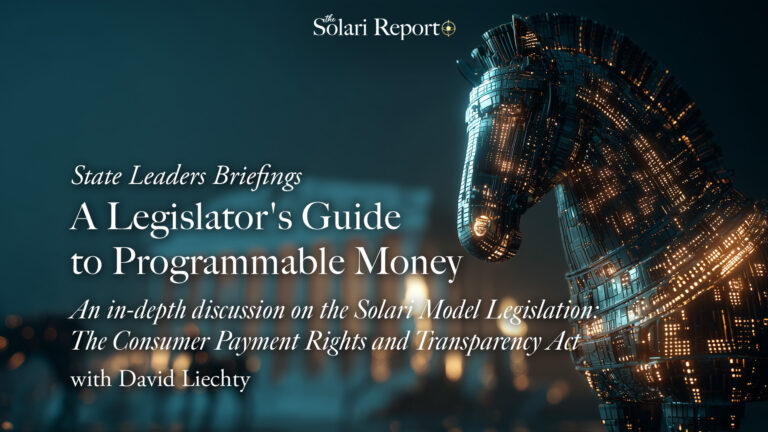In light of recent events, I am republishing.]
By Catherine Austin Fitts
In the fall of 2001 I attended a private investment conference in London to give a paper, The Myth of the Rule of Law or How the Money Works: The Destruction of Hamilton Securities Group.
The presentation documented my experience with a Washington-Wall Street partnership that had:
- Engineered a fraudulent housing and debt bubble;
- Illegally shifted vast amounts of capital out of the U.S.;
- Used “privitization” as a form of piracy – a pretext to move government assets to private investors at below-market prices and then shift private liabilities back to government at no cost to the private liability holder.
Other presenters at the conference included distinguished reporters covering privatization in Eastern Europe and Russia. As the portraits of British ancestors stared down upon us, we listened to story after story of global privatization throughout the 1990s in the Americas, Europe, and Asia.
Slowly, as the pieces fit together, we shared a horrifying epiphany: the banks, corporations and investors acting in each global region were the exact same players. They were a relatively small group that reappeared again and again in Russia, Eastern Europe, and Asia accompanied by the same well-known accounting firms and law firms.
Clearly, there was a global financial coup d’etat underway.
The magnitude of what was happening was overwhelming. In the 1990’s, millions of people in Russia had woken up to find their bank accounts and pension funds simply gone – eradicated by a falling currency or stolen by mobsters who laundered money back into big New York Fed member banks for reinvestment to fuel the debt bubble.
Reports of politicians, government officials, academics, and intelligence agencies facilitating the racketeering and theft were compelling. One lawyer in Russia, living without electricity and growing food to prevent starvation, was quoted as saying, “We are being de-modernized.”
Several years earlier, I listened to three peasant women describe the War on Drugs in their respective countries: Colombia, Peru, and Bolivia. I asked them, “After they sweep you into camps, who gets your land and at what price?” My question opened a magic door. They poured out how the real economics worked on the War on Drugs, including the stealing of land and government contracts to build housing for the people who are displaced.
At one point, suspicious of my understanding of how this game worked, one of the women said, “You say you have never been to our countries, yet you understand exactly how the money works. How is this so?” I replied that I had served as Assistant Secretary of Housing at the US Department of Housing and Urban Development (HUD) in the United States where I oversaw billions of government investment in US communities. Apparently, it worked the same way in their countries as it worked in mine.
I later found out that the government contractor leading the War on Drugs strategy for U.S. aid to Peru, Colombia and Bolivia was the same contractor in charge of knowledge management for HUD enforcement. This Washington-Wall Street game was a global game. The peasant women of Latin America were up against the same financial pirates and business model as the people in South Central Los Angeles, West Philadelphia, Baltimore and the South Bronx.
Later, courageous reporting by several independent investigative reporters confirmed in detail that the privatization and economic warfare model I discussed in London had deep roots in Latin America.
We were experiencing a global “heist”: capital was being sucked out of country after country. The presentation I gave in London revealed a piece of the puzzle that was difficult for the audience to fathom. This was not simply happening in the emerging markets. It was happening in America, too.
I described a meeting that had occurred in April 1997, more than four years before that day in London. I had given a presentation to a distinguished group of U.S. pension fund leaders on the extraordinary opportunity to re-engineer the U.S. federal budget. I presented our estimate that the prior year’s federal investment in the Philadelphia, Pennsylvania area had a negative return on investment.
We presented that it was possible to finance places with private equity and re-engineer the government investment to a positive return and, as a result, generate significant capital gains. Hence, it was possible to use U.S. pension funds to significantly increase retirees’ retirement security by successfully investing in American communities, small business and farms — all in a manner that would reduce debt, improve skills, and create jobs.
The response from the pension fund investors to this analysis was quite positive until the President of the CalPERS pension fund — the largest in the country — said, “You don’t understand. It’s too late. They have given up on the country. They are moving all the money out in the fall [of 1997]. They are moving it to Asia.”
Sure enough, that fall, significant amounts of moneys started leaving the US, including illegally. Over $4 trillion went missing from the US government. No one seemed to notice. Misled into thinking we were in a boom economy by a fraudulent debt bubble engineered with force and intention from the highest levels of the financial system, Americans were engaging in an orgy of consumption that was liquidating the real financial equity we needed urgently to reposition ourselves for the times ahead.
The mood that afternoon in London was quite sober. The question hung in the air, unspoken: once the bubble was over, was the time coming when we, too, would be “de-modernized?”
In 2009 — more than seven years later — this is a question that many of us are asking ourselves.
Part II: Rethinking Diversification
Related Reading:
Dillon, Read & Co. Inc. and the Aristocracy of Stock Profits





















































































































And last suggestion on links to read is:
http://jameshowardkunstler.typepad.com/clusterfuck_nation/
PEACE!
In response to..The truth:
And you are…?
I am hoping your reply is…”I am Muerte!” : )
I have just read this wholeblog and my thoughts have to be to ask you all, what do you think happens when you die? You have no more thoughts! That’s it! The end! So, what is the most important thing that you can do right now? Can you change any of these economic, greedy, ponerological schemes and make the world a better place? The answer is Yes! But you have to get up and go somewhere and hug someone. Yes, you have to show them that you mean what you say that you love them.
I have seen by these blogs that all of you are very learned and bright individuals, as I myself am not. I am just a simple man and I do good as much as feasible, I take nothing from no one without paying for it, and I spend most of my awakened time making other people smile. I don’t know how to solve the problems you all have mentioned. I don’t know what to do about any of it. As I stated, I am just a simple man. Tomorrow I may be dead, or living in a very dark world. However, I will not stop making people smile just because I have no food or electricity or a job.
My point is this: We haven’t, as people, evolved to a level of understanding why we are here on earth, nor have we understood the power of good and evil, nor have we seen the Light. But we will! Until then, hug your neighbor, smile, and walk on!
As John Merryman said, how do we know what is past and what is future? We may be looking at it as in a mirror…dimly! The Past may very well BE our Future! But as for “Bad” people, they’re here. As for “Good” people, where are they?
This is a first time visit for me and I’ll be coming back. However, regarding the subject of this post, I think that for anyone who has been paying attention to FrontLine over the last 8 years or for anyone that has read “Confessions of an Economic Hit Man” (John Perkins), this is old news, obviously not so for Ms. Fitts since she started seeing these things take shape since the mid-90’s.
I strongly recommend the “Confessions…” book as well as Marjorie Kelly’s book, “The Divine Right of Capital”. Although they can be a little depressing, it’s nice to know what you need to prepare for, modern Corporate Feudalism and whatever that will entail.
John:
You may want to read several pieces I have written re Perkins and Kelly:
Will the Real Economic Hit Men Please Stand Up
http://www.scoop.co.nz/stories/HL0503/S00090.htm
along with the two posts here called “Material Omissions”.
Best,
Catherine
Great post.
1st, we should begin by calling the FED, exactly what they are: “Private, Central Bankers”; this would peak the curiosity of the reader, and prompt them to read and investigate further, on their own.
2nd, everyone should be encouraged to read anything they can about the ‘History of Money’, or the ‘History of Banking’; this will inevitably lead the reader to todays Federal Resrve System, their relationship to England, Germany, the CFR, etc. There are numerous online papers, articles and books. You do not need to leave your computer.
It will then become clear, the relationship of industry, banking and government to each other.
I believe the current state of our economy was known, in advance by the ‘FED’, and the plan all along was for the big banks to take over the little banks. The loose money policy was to expose banks to the credit defaults, and ultimately eliminate smaller banks as competitors, at the tax payers expense. Sort of a ‘Controllled Depression’.
Finally, you need to EDUCATE your elected representatives, 1ST at the State level, and then the Federal Level. Because, I believe most if not all of them, do not have a clue.
Rep. Kanjorsky, during his recent appearance on C-Span, assuming he is correct in the dates, described Paulson’s statements to Congress in September concerning an event that took place “last Thursday”, in which a run was made on the money market that nearly crashed the American economy on the spot, and came within a couple of hours of crashing the global economy. The “last Thursday” he spoke of would have been September 11, 2008 between the hours of 9:00 and 11:00. If it had not been shut down and stabilized by changing the limits of insured deposits to 250,000, it is estimatad that 5.3 trillion dollars would have been sucked out of the system, collapsing the world economy, and who know what else.
Had you heard of this new “Sept. 11” and what do you make of it?
Dear Catherine: May I then be of service to your readers? What are the demographics of your readers? Are they of the real world of the masses of which we speak? My world is one of cash, poverty, families living at the edge. I have no bank account neither do many of my friends. We are literate in the sense that we read the daily papers with vigor but at the local library. We even talk about the Constitution of the United States, the socialism in Europe, the promise of Obama and laugh at the issues now faced by the elite. Yes, you home is Hickory Valley and on Google it says the median income for a household in the town was $15,313, and the median income for a family was $22,500. Males had a median income of $21,875 versus $14,688 for females. The per capita income for the town was $8,935. There were 18.4% of families and 16.2% of the population living below the poverty line, including 16.3% of under eighteens and 16.7% of those over 64. This sounds like the real world. Where there is no money for a 401K and thus no risk of “destroyed wealth”. Yes, poverty is colorless, and poor whites in my humble opinion are the most forgotten of all in the United States just as forgotton as poor others. As a man of colour, I think how sad that poor whites are so forgotten. But the same goes with poor anything. So readers please allow me an example of barter: My cousin lost his car and was thumbing it to work at a local company. My other buddy told me about my cousin thumbing it to work “‘cuz they p’cked’em up n took’em to work” when they see him on the road. Upon hearing this I said a prayer to my Dear Lord and asked Him to give me strength to help my cousin. I then saw a truck selling for $2,000 in my city (I live 270 miles nearby) and bought that truck with money I was saving because I needed that truck for my job but not quite yet. So I bought that truck and called my cousin that he shouldn’t be thumbin-it to work and I lent him my truck for only one year in exchange that he would watch over my 83 year old father who lived in a house one block from my cousin. He agreed to watch my father and his son mowed the lawn. We solved two problems – I had someone take care of my fathers home; and my cousin got to work. He saved money to get his own truck, I got my truck back a year later. And we have a bond that lasts longer than any bank loan. And we both rent…and bring up our families. I have countless stories of people at the edge. Now you tell me readers…is this the world that you know?